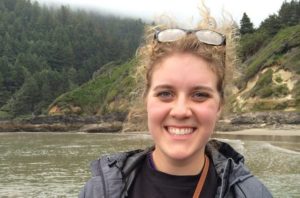Megan Hoff recently completed her graduate research assistantship in Green Bay, working for Sea Grant Staffer Julia Noordyk. This was the first time such an opportunity has been offered at one of our field offices. Hoff’s work for Noordyk and for her master’s degree in environmental science and policy at the University of Wisconsin-Green Bay involved working with the community to develop a watershed management plan for Mahon and Wequiock creeks, which flow through the campus.

Megan Hoff on the Oregon Coast. Image by Austin Yantes
I caught up with Hoff recently, just after she finished a drive across the country to Oregon, where she is starting a new job in Newport as a shellfish assessment biologist. Yes, she’ll be working with clams.
You may wonder how that relates to all the community work she did for her assistantship post. Never fear, Hoff will not abandon her people skills entirely for the company of mollusks.
True, she will be working to document where different species of clams are found along the bays of the Oregon coast, but she will also be on the beach surrounded by beachgoers and people who like to clam recreationally.
Hoff described it like this: “My graduate research assistantship enabled me to not only graduate with my master’s degree debt-free, but I also graduated armed with a suite of new and improved technical and personal skills. Julia and the rest of the Sea Grant folks inspired me and prepared me to address coastal and watershed-based community management and planning challenges. Although the shellfish management challenges are not exactly the same, they still require similar ways to think about how to tackle them.”
Hoff credits her community science communication work with Sea Grant for giving her a leg up on her competition for this full-time permanent job.
“The folks here in Oregon thought my interdisciplinary skills were something unique that I could contribute to their program. My skills in interacting with community members will be really useful and valuable in transitioning to my new life in Oregon,” Hoff said.
Although she is thrilled by this new opportunity, leaving Wisconsin was hard for Hoff.
“I was sad to leave, especially since I didn’t get to say any proper in-person goodbyes to any of the folks I worked with because of social distancing and COVID-19. But I felt so supported and appreciated. Julia and the UW-GB Cofrin Center for Biodiversity staff gave me so much of their time, effort, energy, words of praise and encouragement over the last two years. Without that, I wouldn’t have been as successful.”
Given Hoff’s strong skill set from her academic and Sea Grant experiences, I somehow suspect her success will continue.


